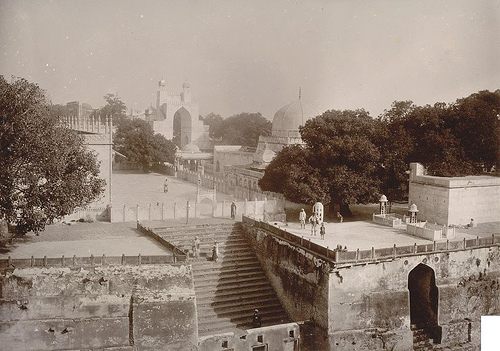In the Name of Allah the Most Merciful, Most Compassionate
Countless blessing and greetings upon the Best of Creation, His Blessed Prophet (sallallahu alyhe wasallam).
Allah Subhana wa Ta’aala has commanded us in the Holy Qur’an that we should save our children from a fire whose fuel is human beings and stones (man-made idols).
Â
O ye who believe! save yourselves and your families from a Fire whose fuel is Men and Stones, over which are (appointed) angels stern (and) severe, who flinch not (from executing) the Commands they receive from Allah, but do (precisely) what they are commanded. [Quran 66:6]
Â
Â
The word “responsibility” in the Merriam-Webster English dictionary is defined as “the quality or state of being responsible: as a : moral, legal, or mental accountability.”
Â
There a several ahadith of the Beloved Prophet (may Allah bless him and grant him peace) that explain responsibility. The most well-known of them are:
Â
Ibn ‘Umar (may Allah be pleased with him) reported that the Prophet, may Allah bless him and grant him peace, said, “All of you are shepherds and each of you is responsible for his flock. A man is the shepherd of the people of his house and he is responsible. A woman is the shepherd of the house of her husband and she is responsible. Each of you is a shepherd and each is responsible for his flock.” and
Â
Ibn ‘Umar (may Allah be pleased with him) reported that the Prophet, may Allah bless him and grant him peace, said, “All of you are shepherds and each of you is responsible for his flock. A man is the shepherd of the people of his house and he is responsible. A woman is the shepherd of the house of her husband and she is responsible. Each of you is a shepherd and each is responsible for his flock.”
Â
In Arabic, the word used for the one responsible is mas-oulun. The root of this word is S-A-L and derived from it are words such as sa-ala (to ask or he asked), su-ila (to be asked or to be questioned) and su-aalun (a question). Thus mas-oulun in reality is the one who will be questioned about that which, or the ones who, he was responsible over. The ahadith delineates who is responsible for what and the questioning about these responsibilities will be on the Day of Judgement.
Â
A shepherd is someone who is watchful over his herd. He rests with one eye open mindful of the fact that lurking in the bush are wild predators who are too ever-diligent. He tends to his flock when they are hurt or ill, and separates the sick animals from the herd for the better of the others until they are well again. He cares for their diet and cleanliness to prevent malnutrition and infection. Why should parenting be any different?
Â
Thus as parents, we have a set of responsibilities in the household. The father must provide food, clothing, shelter, and a sound education to his children. With respect to education, he is mas-oulun of (will be questioned ) specifically about whether or not he had taught his children the Quran and taught the them what is right and what is wrong. He is to marry a pious woman who has good moral values so that she can practically raise the child with good character. If the mother and father don’t have the knowledge of the Quran and how to pray and so forth, they should hire someone to do it. Nevertheless, they are not free from this responsibility. Thus, you (parents) and no one else are responsible for your children’s upbringing and education.
 Â
Allah Subhana Wa Ta’ala is the Giver of Knowledge, but the nature of learning involves a process, one mostly requiring sacrifice of time, effort, and wisdom.  Learning does not happen if you do not make an effort and provide a means and environment for your children to flourish. You must encourage them to seek knowledge, to gain it, to apply it, then to pass it on to the next generation. After all, is it or not in your interest to save your spiritual nasl (lineage) and not just your family lineage? Is it or not in your interest that after you leave this world that they pray for you? Is it or not your interest that they have the emotional and spiritual tools to navigate through the difficult trails and tribulations of life so that they do not become a liability on you and society in your old age? A sound Islamic education has countless benefits. Those mentioned here are but a few.
Â
When I ask parents why is it they do not send their children for classes or why are they not showing up for class, the answer usually is “They don’t want to come during such and such time” or “They have too much homework” or some other reason. Muslim parents, today’s children and teenagers have countless pressures, excessive homework, school, friends and peers and to add to these, they have way too many distractions with the coming of the electronic age. Its easy for parents to feel that their children are already burdened and overwhelmed, so why add more “education” on their plate? My answer to that question is another question. “How many children would actually say “I want to learn Islam. I am interested in learning more, I want to seek and gain knowledge,” if we don’t encourage them towards this end?” If parents were to leave their children’s education in the hands of their children, do you think they will incline towards it without question? Thus, parents, its you who must encourage them towards this end whether they like it or not.  You must engage with then by asking them what they know about their religion and when they are at it, what they have learned. You must also attend the Islamic classes they take so that you too can understand its importance, and by having them revise and by asking and assessing their progress.  Who said parenting was easy let alone raising wise, and moral children?
Â
Then when they have started on that path, you must encourage them to stay with the program and not to become the Islamic school dropout. Our elders used to say that when you start something, finish it. Traditional scholars tell a story that describes this value well. Two young men set out to find water. One digs two feet and doesn’t find water, moves on to another spot in the field and after finding  nothing after two feet again moves on until he digs hundreds of holes without ever striking water. The second youth digs and doesn’t stop digging until he strikes water at 25 feet. Who worked harder? Who worked smarter? Who reached his goal? We must support them to work hard but also to work smart.Â
Â
This parable tells a great deal about the youth, who, mind you, are our future. It reflects the impatience expressed when it comes to Islamic learning. This generation especially has changed so much in such a short period of time in contrast to their parents and grandparents, who 10-30 years ago were in their shoes, yet are galaxies apart. An age where electronic media is everything and where learning of the religion is also becoming limited to Television, YouTube, Facebook, Twitter, and Hadith by way of texting, if you are lucky to have them incline towards the Deen. The remote and flashing images on screens, fast-moving games that are constantly changing,  has changed something deep inside our children forever. They want learning to be fun and to be short and sweet otherwise it is “boring”. And if it doesn’t meet that standard, they may always change the channel on the teacher or abandon their Islamic studies. We can only hope that the reality is not so grim, but what if it is? The statistics surely reflect that.
USA Today recently reported that the Millenium Generation is not interested in “organized” religion. That if this trend is not turned, churches will close in the same way that GM car factories and showrooms have all around the country. Do you think that Muslims will not be affected by this trend? If we are living in the US, our children are bound to take on similar attributes as those who live here no matter how much you try to prevent it. We are not any different. The Prophet (sallallahu alyhe wasallam) once said:
 Â
Man qaama bi qaumin arba’eena yawman fa huwa minhum
Â
He who stays with a nation for forty days, he is one of them.
Â
Think about your teenager 5-10 years from today, when they will have their own children. If now is not the time for them to get an Islamic education, when is? When they are parents do you think they will have the time to get an Islamic education in that stage of your life? Are you able to? Then is it fair to them to think that they will find the time?Â
Â
The In-and-Out syndrome or the two-feet syndrome is a sign of our times because committment is hard to find but it’s also laziness both on the parents’ and children’s behalf. And laziness is disliked in this religion of yours as one is encouraged to flee it or to seek refuge from it:
Â
The following dua has been related from the Messenger (upon whom be peace) for protection against laziness among other problems:
Allahumma inni aaudhu bika minal-ajzi wal-kasli wal-jubni wal-harami wal-bukhli, wa a’udhbika min adhabil qabri, wa a’udhubika fitnatil mahya walmamat.
O Allah, I seek refuge in You from weakness and laziness, miserliness and cowardice, anxiety and sorrow, and I seek refuge in You from the torments of grave, and I seek refuge in You from the trials and tribulations of life and death.
Now here is an exercise that I advise every parent to do. Without your children noticing, listen to the conversations of your children. Listen to the language they use among themselves, how do they talk to each other or write on the Internet. Join Facebook and MySpace and have them become your friend. Then observe what they are saying to each other. Catch up on the slang they use to communicate with each other. If you are not giving them exposure to positive social interaction with other Muslim role models and providing enrichment outlets for them, you will probably be shocked. Don’t lose an opportunity when it comes knocking on your door.Â
Â
Parents, while it is important to give them an education that gets them through this economy, for Muslims, it’s even more important that they gain an education, apply it, then teach it to their offspring and those around them so that they are among the Muflihun (those who prospered, the successful ones) and not  those who become fuel for the fire on that Difficult Day of Reckoning. And the standard of success with respect to Allah Subhana Wa Ta’ala and His Prophet (sallallahu alayhe wasallam) is not only this World.
Â
There are Islamic centers all around the US and the world for this purpose. We are in the electronic age. Classes are available remotely and via the Internet. Seek them out. You will find them. Now do you have an excuse?
Â
The Islamic Educational & Cultural Research Center provides some opportunities for your children to gain an Islamic education. Here is what is currently available:
Â
Â
Call us, we’re here for you. We are spending our late nights to keep these Centers alive. Don’t you think it’s time for you to do your part?
Â
Â
Sharaaz Khan
Â
Sharaaz Khan is Managing Director of the Islamic Education and Cultural Research Center (IECRC) and the IECRC Academy for Youth and Children, Sacramento where he teaches Islamic subjects to children and youth and provides Islamic counseling, mediation, and healing to Muslims and non-Muslims alike. He is a Curriculum Developer, Instructional Designer & Learning Operations professional.










